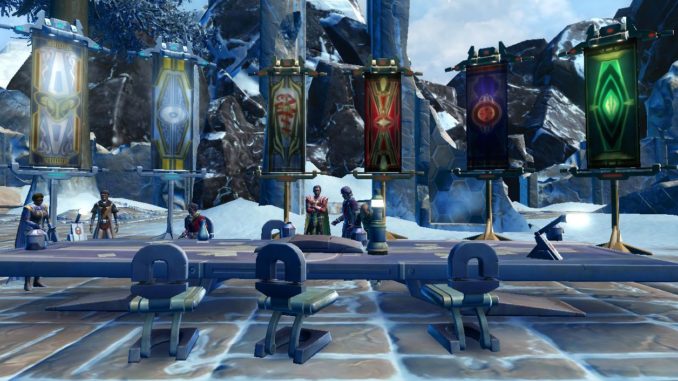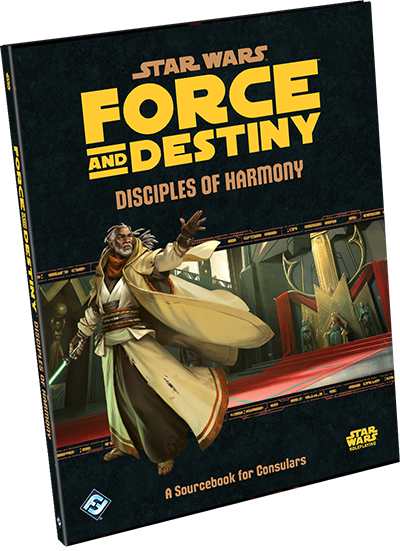
Welcome to the HoloNet Uplink, citizen. This series focuses on Fantasy Flight Games’ Star Wars Roleplaying Game, with content aimed mostly at the Gamemaster. Threats, adventure seeds, rules supplements, and more are all to come for those who access The HoloNet Uplink.
For those of you who have read my Disciples of Harmony review, you may recall I am a big fan of the Diplomacy section. As I noted there, I take special interest as while I am by no means a diplomat my job sometimes entails the application of a lot of the skills which are so neatly encapsulated within this section. The design process for diplomatic scenarios is clear, but flexible, while relaying the feel and flavour of diplomatic negotiations. Before going any further, I must say to anyone reading this who is skeptical about applying this to your game because you aren’t playing Force and Destiny the following: Waaaiiiiittt! Hear me out! This section is well worth it for Edge of the Empire and Age of Rebellion GMs running negotiation scenarios and encounters as well. As just one example, if you’re looking to put some House of Cards Underwood vs. Petrov style action into your Age of Rebellion game to spice up life for your Ambassador then this is absolutely the section for you. That said, I do think this is the perfect book to include content like this. As the self-styled Sourcebook for Consulars, we would have definitely felt the absence of diplomacy guidance.
So let’s dive in. Perhaps saving the best for last, the Consulars and Diplomacy section may be found on pages 90-96 of Disciples of Harmony. If you’ve got a copy, consider flipping it open for the discussion. If not, you know where to look if they get a chance to take a peek at a Friendly Local Gaming Store or get a chance to leaf through a buddy’s. This post will be part glowing review and part discussion of the provided guidance.
The Guidance Provided
The section starts off strong with a solid three-and-a-bit page look at the five main ingredients that go into a diplomatic scenario. These ingredients are:
- Factions
- Objectives, Motives, and Stakes for each Faction
- Obstacles
- Actors
- The Hook
Clear explanations and concise examples are given for each. I must say, a younger Chris would bristle at having a list like this to go through. Now that I’ve become a bit more experienced in my professional life, not to mention feeling the time crunch of adulthood, I welcome this guide to organize the thinking I’m already doing. The book is quite clear that GMs will definitely jump around between ingredients as the scenario is developed. I found having a framework actually helps me be inspired and creative. On my first flip through this section I would think to myself how, say in a certain Rebels episode, a character’s Motive is X, and even outside of Star Wars examples would come to mind. Such as thinking House of Cards villain protagonist Frank Underwood’s Stakes would be Y during Z episode. To me, this is the mark of an adaptable, useful framework.
The second part of the section provides advice on how to run the diplomatic scenario. Disciples of Harmony breaks this down by Jedi principles of Learn and Understand, then Teach and Reconcile. Being a Jedi Consular sourcebook within the Force and Destiny line it is entirely natural to present in this way, but from purely a GM process point of view the advice is almost entirely setting/Force agnostic. PCs will almost certainly want to learn about the situation before taking steps to resolve it. Perhaps the biggest difference, which does not invalidate much if any of the advice, is the base assumption in this book that the PCs will want to reconcile the parties as opposed to get the best deal possible for their own interests. There is some solid practical advice in these pages on running encounters, plus mechanical suggestions for skill checks and Boost dice. There are even a few charts to appease the old school GM in me!
A Clone Wars Example
[embedyt] https://www.youtube.com/watch?v=tZh3AsMY-3o[/embedyt]
In this clip from The Clone Wars Season One Episode 15 Trespass, the Jedi learn that de-escalating a situation with diplomacy is not as easy as it may initially appear. Copyright Disney, presented here for educational purposes.
For the above example involving the Talz and the Pantorans, my homework challenge for you is to list and elaborate on the five ingredients (DoH pg. 90) used. Even if you don’t know the episode, you should have enough info from the clip above to get some good value out of the exercise. Submit in the comments below and maybe we can get a discussion going, and even see if the dreaded “applying RPG rules to the canon” can make an appearance – but this time for the sake of learning. Don’t be shy.
Concluding Remarks
FFG has certainly saved some of the best for last on this sourcebook. While not as dramatic as a new specialization or awesome lightsaber crystal, this last handful of pages provides a solid guide to diplomatic scenarios. I’ll take one last chance to passionately remind folks that this guidance is perfect for GMs in the other lines as well. Wheelers, dealers, and underworld leaders of all stripes within Edge of the Empire negotiate on a constant basis. We’ve seen in Rogue One how fragile the internal cohesion of the early Alliance is, making diplomacy a vital tool during the Age of Rebellion. The more I think about it, the more I start to feel this is “must read” if maybe not “must buy” content for all Star Wars RPG GMs.
I don’t think I’m done with this topic. I’m thinking I would like to revisit it and bring in some common negotiating techniques that various factions could employ, with guidance on how those techniques can impact running the game to include mechanical suggestions. Let me know if that’s something you want to see.
Christopher Hunt
Latest posts by Christopher Hunt (see all)
- Command School – Deterrence and Compellence - July 11, 2019
